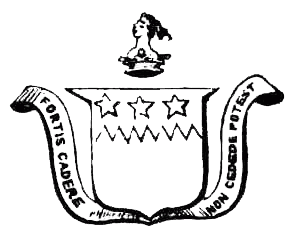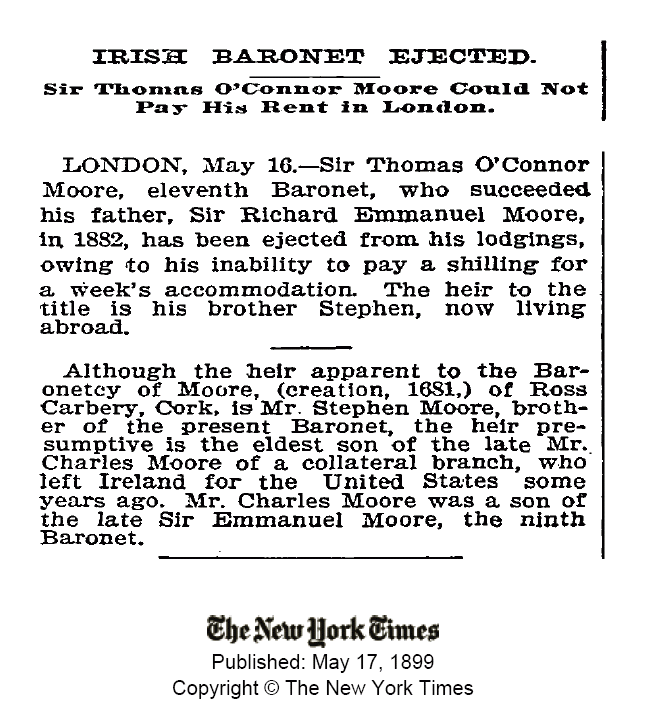Storia dei baronetti Moore di Rosscarbery
James Adolphus Moore, suocero del mio bisnonno James Drake, era nipote (figlio del figlio) di Sir Emanuel Moore (1722-1793), 7° Baronetto di Rosscarberry, nella Contea di Cork, in Irlanda.
Clicca qui per vedere l'albero discendente completo. Questo albero comprende 13 generazioni e 330 individui, di cui 196 discendenti diretti e 109 cognomi unici.
Il titolo di Baronetto di Rosscarberry era stato assegnato il 29 giugno 1681.
Si sono succeduti 11 baronetti:

1° Baronetto - Sir Emanuel Moore (1620-1692)
2° Baronetto
- Sir William Moore (1663-1693)
3° Baronetto - Sir Emanuel Moore
(1685-ca 1733)
4° Baronetto - Sir Charles Moore (d. 1754)
5° Baronetto - Sir Robert Moore (d. ca 1758)
6° Baronetto - Sir William
Moore (d. ca 1783)
7° Baronetto - Sir Emanuel Moore (1722-1793)
8° Baronetto - Sir Richard Moore (1744-ca 1815)
9° Baronetto
- Sir Emanuel Moore (1786-1849)
10° Baronetto - Sir Richard Emanuel Moore
(1810-1882)
11° Baronetto - Sir Thomas O'Connor Moore (1845-1926)
Il titolo si è estinto con il decesso di Sir Thomas O'Connor Moore.
Nota: Il titolo di baronetto è stato creato per la prima volta dal re Giacomo I di Inghilterra nel 1611, in Inghilterra e Irlanda il titolo è ereditario.
Articolo apparso su "The Illustrated Police News" del 2 febbraio 1867
'The following romance of the aristocracy appears in one of the Dublin papers: - One of those cases which have afforded Sir Barnard [sic] Burke material for some of his deeply interesting works, in which the vicissitudes of noble houses are set forth, has recently been brought to light by certain proceedings in Capel-street Police-office. On the 19th of October [presumably 1866] a young lad, aged about 16, was brought up before Mr. J.C. O'Donel, charged with having stolen from Mr. Alfred Nelson, photographer, a mahogany glass-case containing a number of photographs. The prisoner, who gave his name as Emanuel Moore, had been employed by Mr. Nelson as a porter, and while in his employment had taken away the articles and sold them. So far there is nothing more in the case that what occurs in the daily record of crime in all our police-offices; but subsequent inquiries led to a revelation at once strange and painful, if young Moore's statements be true. As an explanation of his committing the offence he stated that his father, who is an Irish baronet of one of the oldest creations, had been reduced to a condition of such abject poverty as to be now under the necessity of selling matches in the streets of Dublin to obtain a wretched subsistence, and that he had sold the articles which he had stolen to furnish them with some of the ordinary necessities of life. The criminal - if such he can be called - was, in accordance with the law which he had violated, not the less that the doing so was an act of filial duty, sentenced to two months' imprisonment, which he is now undergoing. The mother of the unfortunate lad was sister to an Irishman who for many years sat in Parliament for an English seat, and who at one time was a great popular leader of the English working classes. We understand that an effort is being made to obtain a commutation of young Moore's sentence, and to provide for his father and himself some employment which will release them from actual pauperism.'Based on the facts contained in the above report, Sir Richard Emanuel Moore is the only possible candidate for the match-selling baronet. This is confirmed by the fact that he did have a son, Emanuel, who was born in 1853 and who died before his father. As to the boy's mother, she was the 10th baronet's second wife, Margaret Matilda O'Connor. The brother referred to as being in Parliament must therefore have been Feargus Edward O'Connor, MP for co.Cork 1832-1835 and Nottingham 1847-1852. He was a leading figure in the Chartist movement during the 1830s and 1840s.
The baronetcy became either extinct or dormant in 1926; more likely the latter, since the entry under this baronetcy in Dod's Peerage for 1916 contains a note stating that the heir to the baronetcy would be the eldest male descendant of Charles, son of the 9th baronet, who died in the United States, leaving several sons.
Necrologio pubblicato su "The Illustrated London News" dell'8 luglio 1882
Sir Richard Emanuel Moore, tenth Baronet, of Ross Carberry, County Cork, whose death is just announced, was born in 1810, the eldest son of Sir Emanuel Moore, ninth Baronet, and succeeded his father in 1849. He married, first, in 1839, Mary Anne, daughter of Mr Arthur R O'Connor; and secondly, in 1851, Margaret Matilda, daughter of Mr Roger O'Connor, by the former of whom he leaves a son and successor, now Sir Thomas O'Connor Moore, eleventh Baronet. Although the representative of a baronetcy conferred so far back as 1681, Sir Richard Emanuel Moore was a sad instance of the misery of a landless title. At one time he held the situation of third-class turnkey at Spike Island, and subsequently was reduced to the direst need. After vainly endeavouring to support himself by selling among the county families a book written by his wife, the poor Baronet opened a coal store in his son's name, but his want of capital defeated this his last venture.Articolo apparso sul quotidiano "The New York Times" del 17 maggio 1899
